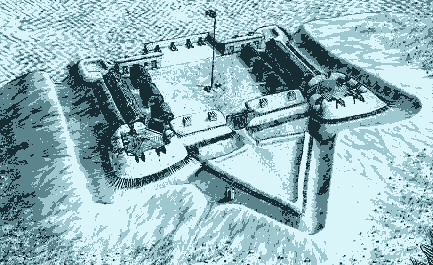Though the fort had fallen into ruin, the site was reoccupied by British and Native forces that besieged Fort Meigs in the spring of 1813.
Under the command of General Green Clay, about 1,200 new recruits from the Kentucky Militia arrived at Fort Meigs. The fort’s commander, General William Henry Harrison, gave instructions to Clay to send a detachment of 800 troops to launch a surprise attack on the British batteries.
Led by Colonel William Dudley, this detachment successfully spiked the British cannons. Instead of returning to the safety of Fort Meigs as planned, the new recruits, emboldened by their success, pursued some Native Americans into the forest. Dudley and his officers tried to stop the wayward troops, but their efforts failed and they found themselves lured into a trap and counterattack by British and Native forces.
In the area where the Maumee library now stands, Dudley’s forces were trounced in battle. Dudley and more than 200 of his troops were killed. Another 350 were captured and taken to Fort Miamis where they were forced to run a gauntlet until Shawnee Chief Tecumseh arrived and convinced the warriors to stop the killing.
Dudley’s Massacre, also known as Dudley’s Defeat, was a loss for the U.S. military, the successful destruction of the British cannon helped convince the British soldiers to lift their siege of Fort Meigs. The American Indians persuaded their British allies to attack the fort again in July 1813, but once again, the U.S. defenders were victorious.
These successful defenses of Fort Meigs marked the beginning of the end for the British in the Northwest Territory.
In October 1813, Harrison defeated British and Native forces led by Tecumseh and General Henry Procter at the Battle of the Thames in Canada, which ended British occupation in much of the Northwest and ended Tecumseh’s confederation as well.

